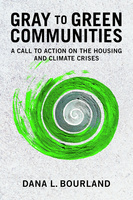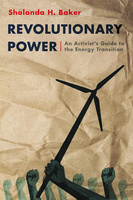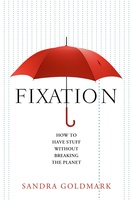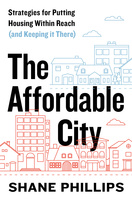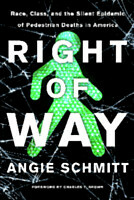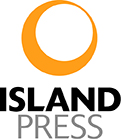
Island Press began with a simple idea: knowledge is power—the power to imagine a better future and find ways for getting us there. Founded in 1984, Island Press’ mission is to provide the best ideas and information to those seeking to understand and protect the environment and create solutions to its complex problems.
Showing 91-105 of 330 items.
Getting to the Heart of Science Communication
A Guide to Effective Engagement
By Faith Kearns
Island Press
Scientists today working on controversial issues from climate change to drought to COVID-19 are finding themselves more often in the middle of deeply traumatizing or polarized conflicts they feel unprepared to referee. It is no longer enough for scientists to communicate a scientific topic clearly. They must now be experts not only in their fields of study, but also in navigating the thoughts, feelings, and opinions of members of the public they engage with, and with each other. And the conversations are growing more fraught.
In Getting to the Heart of Science Communication, Faith Kearns has penned a succinct guide for navigating the human relationships critical to the success of practice-based science. This meticulously researched volume takes science communication to the next level, helping scientists to see the value of listening as well as talking, understanding power dynamics in relationships, and addressing the roles of trauma, loss, grief, and healing.
In Getting to the Heart of Science Communication, Faith Kearns has penned a succinct guide for navigating the human relationships critical to the success of practice-based science. This meticulously researched volume takes science communication to the next level, helping scientists to see the value of listening as well as talking, understanding power dynamics in relationships, and addressing the roles of trauma, loss, grief, and healing.
Building Community Food Webs
By Ken Meter
Island Press
In Building Community Food Webs, Ken Meter shows how grassroots leaders across the U.S. are constructing civic networks to create healthier and more equitable food systems. Overturning extractive economic structures, these inspired food leaders are engaging low-income residents, farmers, and local organizations in their quest to build stronger communities.
Network-building takes a variety of forms and arises out of multiple activities. Farmers and researchers may convene to improve farming practices collaboratively. Food banks engage their clients to challenge the root causes of poverty. Municipalities invest large sums to protect farmland from development.
Building Community Food Webs captures the essence of these efforts, and offers pragmatic insights for community food leaders anywhere.
Network-building takes a variety of forms and arises out of multiple activities. Farmers and researchers may convene to improve farming practices collaboratively. Food banks engage their clients to challenge the root causes of poverty. Municipalities invest large sums to protect farmland from development.
Building Community Food Webs captures the essence of these efforts, and offers pragmatic insights for community food leaders anywhere.
Flames of Extinction
The Race to Save Australia's Threatened Wildlife
Island Press
In the early months of 2020, the world’s attention was riveted on Australia, where the nation’s iconic wildlife fought for survival in the face of unprecedented wildfires. Images of koalas drinking from firefighters’ water bottles went viral and became the global face of a catastrophe that would kill as many as three billion animals. Known as the Black Summer, the fire season was responsible for more wildlife deaths and near-extinctions than any other single event in Australian history. Flames of Extinction, written by a journalist at the heart of this news coverage, is the first book to tell the stories of Australia’s record-setting fires, focusing on the wild animals and plants that will be forever changed. Through evocative and urgent storytelling, Flames of Extinction puts readers on the ground to witness the aftermath of one of Australia’s greatest tragedies and inside the inspiring effort to save lives.
Rewilding Agricultural Landscapes
A California Study in Rebalancing the Needs of People and Nature
Island Press
As the world population grows, so does the demand for food, putting unprecedented pressure on agricultural lands. In many desert dryland regions, however, intensive cultivation is causing their productivity to decline precipitously. “Rewilding” the least productive of these landscapes offers a sensible way to reverse the damage, recover natural diversity, and ensure long-term sustainability of remaining farms and the communities they support.
This accessibly written, groundbreaking contributed volume is the first to examine in detail what it would take to retire eligible farmland and restore functioning natural ecosystems. The lessons in Rewilding Agricultural Landscapes will be useful to conservation leaders, policymakers, groundwater agencies, and water managers looking for inspiration and practical advice for solving the complicated issues of agricultural sustainability and water management.
This accessibly written, groundbreaking contributed volume is the first to examine in detail what it would take to retire eligible farmland and restore functioning natural ecosystems. The lessons in Rewilding Agricultural Landscapes will be useful to conservation leaders, policymakers, groundwater agencies, and water managers looking for inspiration and practical advice for solving the complicated issues of agricultural sustainability and water management.
Reinventing Food Banks and Pantries
New Tools to End Hunger
Island Press
In the US, food banks and pantries provide billions of meals a year to people in need. And yet hunger still affects one in nine Americans. What are we doing wrong? In Reinventing Food Banks and Pantries, Katie Martin presents a new model for charitable food, one where success is measured not by pounds of food distributed but by lives changed. The key is shifting our focus from a lack of food to strategies that build empathy, equity, and political will. Martin shares solutions in a warm, engaging style, with simple steps that anyone working or volunteering at a food bank or pantry can take today. Solutions range from providing client choice, where individuals select their own food with dignity, to offering job training programs and joining the fight for a living wage. As Martin writes, it takes more than food to end hunger. Picking up this insightful, lively book is a great first step.
The Monsanto Papers
Deadly Secrets, Corporate Corruption, and One Man’s Search for Justice
By Carey Gillam
Island Press
Gray to Green Communities
A Call to Action on the Housing and Climate Crises
Island Press
In Gray to Green Communities, green affordable housing expert Dana Bourland argues that we need to move away from a traditional gray housing model, to a green housing model, which considers the health and well-being of residents, their communities, and the planet.
Bourland draws from her experience leading the Green Communities Program at Enterprise Community Partners, which resulted in the first standard for green affordable housing.
The book opens with the potential of green affordable housing, followed by the problems that it is helping to solve, challenges in the approach that need to be overcome, and recommendations for the future of green affordable housing. Gray to Green Communities brings together stories from the people and projects of the Green Communities’ program.
Gray to Green Communities will empower and inspire anyone interested in the future of housing and our planet.
Bourland draws from her experience leading the Green Communities Program at Enterprise Community Partners, which resulted in the first standard for green affordable housing.
The book opens with the potential of green affordable housing, followed by the problems that it is helping to solve, challenges in the approach that need to be overcome, and recommendations for the future of green affordable housing. Gray to Green Communities brings together stories from the people and projects of the Green Communities’ program.
Gray to Green Communities will empower and inspire anyone interested in the future of housing and our planet.
Revolutionary Power
An Activist's Guide to the Energy Transition
Island Press
In Revolutionary Power, Shalanda Baker arms those made most vulnerable by our current energy system with the tools they need to remake the energy grid in the service of their humanity. She argues that people of color, poor people, and indigenous people must engage in the creation of the new system in order to upend unequal power dynamics.
Baker provides a playbook for the energy transformation complete with a step-by-step analysis of the key energy policy areas that are ripe for intervention. She tells the stories of those who are working to be architects of a more just system and draws from her own experience as an energy-justice advocate, a lawyer, and a queer woman of color.
Revolutionary Power is the guide to a just energy transformation.
Baker provides a playbook for the energy transformation complete with a step-by-step analysis of the key energy policy areas that are ripe for intervention. She tells the stories of those who are working to be architects of a more just system and draws from her own experience as an energy-justice advocate, a lawyer, and a queer woman of color.
Revolutionary Power is the guide to a just energy transformation.
Leadership for Sustainability
Strategies for Tackling Wicked Problems
Island Press
Solving today’s environmental and sustainability challenges requires more than expertise and technology. Effective solutions will require that we engage with other people, wrestle with difficult questions, and learn how to adapt and make confident decisions despite uncertainty. We need new approaches to leadership that empower professionals at all levels to tackle wicked problems and work towards sustainability.
Leadership for Sustainability gives readers perspective and skills for promoting creative and collaborative solutions. Blending systems thinking approaches with leadership techniques, it offers dozens of strategies and specific practices, illustrated by inspiring case studies. Readers will come away with a holistic understanding of how to lead from where they are by applying leadership principles and practices to a wide range of wicked situations.
Leadership for Sustainability gives readers perspective and skills for promoting creative and collaborative solutions. Blending systems thinking approaches with leadership techniques, it offers dozens of strategies and specific practices, illustrated by inspiring case studies. Readers will come away with a holistic understanding of how to lead from where they are by applying leadership principles and practices to a wide range of wicked situations.
The Bird-Friendly City
Creating Safe Urban Habitats
Island Press
How does a bird experience a city? A backyard? A park? As the world has become more urban, noisier from increased traffic, and brighter from streetlights and office buildings, it has also become more dangerous for countless species of birds. In The Bird-Friendly City, Timothy Beatley, a longtime advocate for intertwining the built and natural environments, takes readers on a global tour of cities that are reinventing the status quo with birds in mind. Efforts span a fascinating breadth of approaches: public education, urban planning and design, habitat restoration, architecture, art, civil disobedience, and more. Readers will come away motivated to implement and advocate for bird-friendly changes, drawing from inspiring examples that show it’s possible to make our urban environments more welcoming for many bird species.
Naturalist
A Graphic Adaptation
Island Press
E.O. Wilson’s bestselling memoir comes to life in a beautifully illustrated graphic adaptation.
Diversifying Power
Why We Need Antiracist, Feminist Leadership on Climate and Energy
By Jennie C. Stephens; Foreword by Ted Landsmark
Island Press
In Diversifying Power, energy expert Jennie Stephens argues that the key to effectively addressing the climate crisis is diversifying leadership so that antiracist, feminist priorities are central.
Stephens examines climate and energy leadership related to job creation and economic justice, health and nutrition, and housing and transportation. She explains why we need to reclaim and restructure climate and energy systems so policies are explicitly linked to social, economic, and racial justices.
Diversifying Power shows that anyone working on issues related to energy or climate (directly or indirectly) can leverage the power of collective action. The work to shift away from an extractive, oppressive energy system has already begun. By highlighting the creative individuals and organizations making change happen, Diversifying Power provides inspiration and encourages action on climate and energy justice.
Stephens examines climate and energy leadership related to job creation and economic justice, health and nutrition, and housing and transportation. She explains why we need to reclaim and restructure climate and energy systems so policies are explicitly linked to social, economic, and racial justices.
Diversifying Power shows that anyone working on issues related to energy or climate (directly or indirectly) can leverage the power of collective action. The work to shift away from an extractive, oppressive energy system has already begun. By highlighting the creative individuals and organizations making change happen, Diversifying Power provides inspiration and encourages action on climate and energy justice.
The Affordable City
Strategies for Putting Housing Within Reach (and Keeping it There)
Island Press
In The Affordable City, housing expert Shane Phillips argues that to effectively address the housing crisis, cities must support both tenant protections and housing abundance.
Phillips offers more than 50 policy recommendations addressing what he refers to as the “Three S’s” of Supply, Stability, and Subsidy. He makes a moral and economic case for why each is essential and recommendations for making them work together. He ends with a policy blueprint and concise implementation plan for each policy, including whether it should be pursued as an immediate, medium-term, or long-term priority.
The Affordable City is an essential tool for professional city planners, policymakers, public officials, and advocates working to improve affordability and increase community resilience through local action.
Phillips offers more than 50 policy recommendations addressing what he refers to as the “Three S’s” of Supply, Stability, and Subsidy. He makes a moral and economic case for why each is essential and recommendations for making them work together. He ends with a policy blueprint and concise implementation plan for each policy, including whether it should be pursued as an immediate, medium-term, or long-term priority.
The Affordable City is an essential tool for professional city planners, policymakers, public officials, and advocates working to improve affordability and increase community resilience through local action.
Right of Way
Race, Class, and the Silent Epidemic of Pedestrian Deaths in America
By Angie Schmitt; Foreword by Charles T Brown
Island Press
In Right of Way, journalist Angie Schmitt shows that pedestrian traffic deaths are not unavoidable “accidents,” They are predictable, occurring in stark geographic patterns that tell a story about systemic inequality. These deaths are the forgotten faces of an increasingly urgent public health crisis that we have the tools, but not the will, to solve.
Schmitt examines the increase in pedestrian deaths in the US as well as programs and movements that are beginning to respond to the epidemic. Right of Way is a call to reframe the problem, acknowledge the role of racism and classism in the public response to these deaths, and energize advocacy around road safety.
Right of Way unveils a crisis that is rooted in both inequality and the undeterred reign of the automobile in our cities. It challenges us to imagine and demand safer and more equitable cities, where no one is expendable.
Schmitt examines the increase in pedestrian deaths in the US as well as programs and movements that are beginning to respond to the epidemic. Right of Way is a call to reframe the problem, acknowledge the role of racism and classism in the public response to these deaths, and energize advocacy around road safety.
Right of Way unveils a crisis that is rooted in both inequality and the undeterred reign of the automobile in our cities. It challenges us to imagine and demand safer and more equitable cities, where no one is expendable.
Stay Informed
Subscribe nowRecent News







